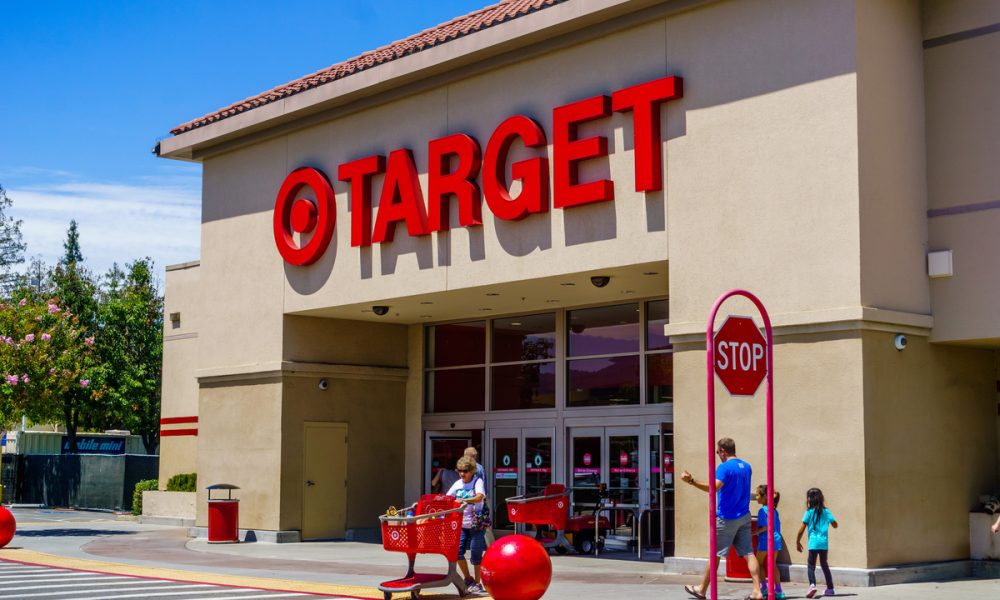Today in retail, ByteDance could sell a small percentage of its stake in online sneaker marketplace Poizon, while merchants deliver context to one-click commerce through shoppers’ smartphones. Plus, Target goes employs “aggressive cost control” measures in the wake of its flagging Q1 fiscal performance.
ByteDance Could Sell Small Share of Sneaker Reseller Poizon
ByteDance is considering selling “a low single-digit percentage point stake” of online sneaker marketplace Poizon, preferably to an existing investor, Bloomberg reported Tuesday (June 7).
Poizon, formally known as Shanghai Shizhuang Information Technology, is valued at more than $10 billion, according to the report. ByteDance, which owns video-sharing platform TikTok, restructured its investment arm this year, eliminating its venture capital group and reorganizing its strategic investment group.
Gap Unveils Demit Omphroy and DOGAMÍ NFTs
Gap has unveiled its third collection of limited-edition non-fungible tokens (NFTs) in partnership with artist and former professional soccer player Demit Omphroy, expanding a collaboration that also includes a graphic T-shirt collection sold at Gap stores.
Gap will kick off the series beginning Tuesday (June 7) at noon ET with three gamified level drops: Common, Rare and Epic. Common NFTs will be on sale for a limited time for 2 tez (XTZ). Rare will be on sale starting Thursday (June 9) for 8 tez (XTZ), and Epic debuts on June 14 for 50 tez (XTZ). The digital collectibles will be available on a first come, first served basis on gap.com/nft, with payments accepted in both fiat and tez.
Gap and Omphroy will also launch a digital auction June 15, featuring single-edition digital art and a custom, hand-painted Gap denim jacket by the artist. Gap x DOGAMÍ NFT wearables will launch as the first fashion collaboration in the petaverse in July, with Digital Gap logo hoodies specifically designed for DOGAMÍ avatars that will let players express their virtual pet’s individual style and have a direct impact on game stats.
Target Pivots to ‘Aggressive Cost Control’ Mode, Spooks Retail Industry Rivals
Just three weeks after announcing an unexpected 40% drop in first quarter profits, Target unveiled an aggressive cost control plan Tuesday (June 7) to address what it calls a “rapidly changing environment” for consumers.
The Minnesota-based operator of 2,000 retail locations, an eCommerce site and delivery service Shipt said its multi-pronged “inventory optimization strategy” was necessary to counter a mix of problems including current industry performance, a challenging operating environment and worsening consumer trends. Target said it would be implementing additional merchandise markdowns to remove excess inventory, while outright canceling some other orders.
While the plan will involve near-term expenses for the retailer, Target Chairman and CEO Brian Cornell said he expected to see improved profitability and a return to normalized seasonal metrics in the second half of the year.
How Does a $1.5B Specialty Retailer Pull off an $8B Take-Under of Kohl’s?
After more than a year of activist approaches, breakup proposals and rebuffed board shake-up plans, Kohl’s announced Monday (June 6) that it was entering into three weeks of exclusive negotiations to sell itself to a little-known vitamin and pet shop retailer that’s only about one-fifth its size.
The newly emerged suitor, Franchise Group, is an Ohio-based “holding company of a collection of market-leading and emerging brands” including Vitamin Shoppe, Buddy’s rent-to-own stores, Pet Supplies Plus and Sylvan Learning Centers. Its bid marks a 40% premium to Kohl’s share price prior to the announcement and topped a purported offer in the mid-$50 range from Sycamore Partners.
While the Kohl’s board reviews the non-binding, $60 per share proposal and Franchise Group conducts its own due diligence and secures its financing partners, investors and industry watchers can only watch and wonder from the sidelines as to the motivation for the deal as well as its probability of success.
Merchants Bring Context to One-Click Commerce Via Smartphones
In-store shopping is seeing a renaissance of sorts as the COVID-19 pandemic continues to fade into the rearview mirror, but shopping in the aisles has changed a bit, Debbie Guerra, head of merchant, ACI Worldwide, told PYMNTS in an interview.
Merchants need to engage with consumers across their devices — linking that hardware to the ability to drive push notifications to consumers, she said. Those notifications, in turn, will spur individuals to move from browsing to buying — with one click to finalize it all, said Guerra.
Ideally, consumers appreciate merchants’ knowing who they are and extending unique offers based on buying patterns across a single brand — or even several brands. That seamless commerce, Guerra said, has “always been imagined, but has not always been delivered as effectively as has been desired.”
——————————
NEW PYMNTS DATA: THE TAILORED SHOPPING EXPERIENCE STUDY – MAY 2022

About: PYMNTS’ survey of 2,094 consumers for The Tailored Shopping Experience report, a collaboration with Elastic Path, shows where merchants are getting it right and where they need to up their game to deliver a customized shopping experience.
Disrupting traditional travel payments — a legacy ecosystem rife with opacity and inefficiency — is potentially a killer app for cryptocurrency, availing…
In April, insufficient funds became the most common reason that consumers’ payments were declined, according to “Digital Economy Payments,” a PYMNTS report…
Companies are investing in digital transformation to fight inflation and overcome other challenges, Samsara executives said Thursday (June 2) during the company’s…
You have successfully joined our subscriber list.
© 2022 What’s Next Media and Analytics™

